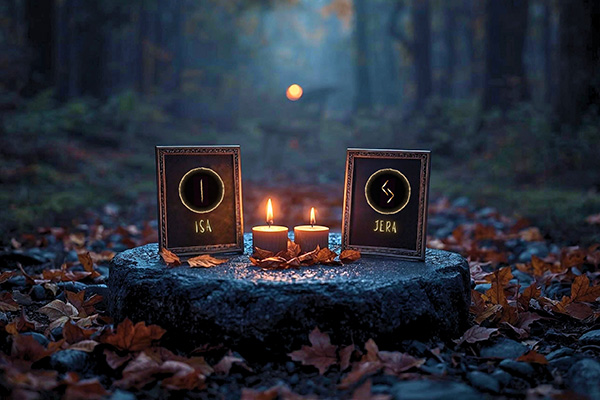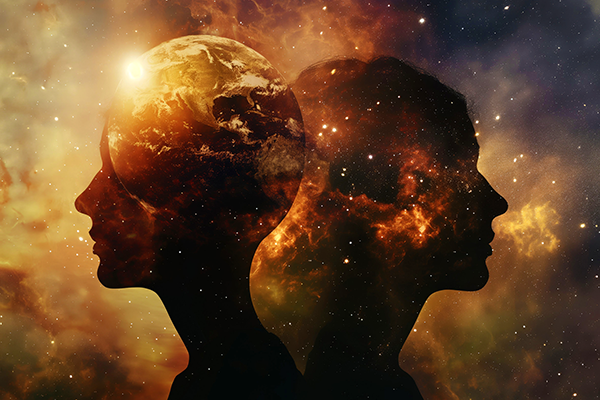self-development
Why This Rune Reader ‘Reverse Plans’ Her Day
 If you’d asked me a few years ago how I welcomed a new day, I would’ve rattled off a checklist: what needs to be done, what must be scheduled, what’s urgent and what’s not. I thought a structure schedule and curated life was strength. I believed that manifesting my future meant controlling it before it even arrived.
If you’d asked me a few years ago how I welcomed a new day, I would’ve rattled off a checklist: what needs to be done, what must be scheduled, what’s urgent and what’s not. I thought a structure schedule and curated life was strength. I believed that manifesting my future meant controlling it before it even arrived.
But somewhere along my spiritual path, I began to dance to a different rhythm. It was a kind of sacred tempo that doesn’t rush or demand. That doesn’t forecast before it senses and feels.
Today, I want to share that magical alternative rhythm with you. I call it reverse planning. It’s not a rigid system, but an invitation to trust time the way a rune whispers its truth.
Our modern culture tends to treat calendars like hammers. We use them to nail down the future with agendas, meetings, goals, and deadlines. On paper, life appears orderly, efficient, and decided. But for many of us, that creates a low-level anxiety that’s hard to name.
We wake up already carrying the weight of what hasn’t even happened yet. The day feels predetermined before we’ve had a chance to participate in it.
As someone who reads runes, symbols that speak across the ancient thresholds of time, I’ve come to believe that true guidance rarely comes in the form of a command. Instead, it arrives quietly, in the pauses, in the spaces between breaths. That’s where reverse planning begins: with presence, not pressure.
Clutter Bust Your Home To Liberate Your Soul
 Choosing what you allow and keep in your life gives you a sense of having control of your happiness and your future.
Choosing what you allow and keep in your life gives you a sense of having control of your happiness and your future.
If you are hoarder, or living a cluttered existence with too many material possessions, know that it is limiting your spiritual growth and personal fulfillment.
The path to enlightenment is not paved with stuff… and more stuff. Maybe it’s time to rid yourself of those things that no longer serve a purpose in your life?
Clutter is rarely just a collection of objects; it is often seen as a physical manifestation of delayed decisions, stagnant energy, or an attachment to the past.
Many spiritual traditions believe that our outer environment is a reflection of our inner state. Buddhism teaches that self and environment are one; in Taoism energy flow affects internal peace; in Hermeticism the small (home) reflects the large (soul); and in Hinduism physical space is a living extension of the self.
In Japanese aesthetics and philosophy, the concept of Ma refers to the pure, essential beauty of empty space. By decluttering, one creates the literal and figurative room for new experiences and thoughts to emerge.
Central tomany wisdom teachings is the idea that suffering stems from attachment. By intentionally removing objects that no longer serve a purpose, we practice the spiritual discipline of “letting go,” acknowledging that our identity is independent of material possessions.
Why Curiosity Is Essential For Spiritual Growth
 These days, it is customary to access information instantly using various modern technologies. All kinds of knowledge are at our fingertips whenever we need it.
These days, it is customary to access information instantly using various modern technologies. All kinds of knowledge are at our fingertips whenever we need it.
While some research is required for school or work projects, and other inquiries are made to simply satisfy a general “need to know,” Spirit challenges us to view our world differently and conduct a different kind of search.
Take time to be still every now and then. Extend your curiosity internally. Go within and take time to reflect on your past decisions, your current situation, and your potential future.
The past is a wonderful place to visit to reminisce about great experiences, evaluate decisions, and learn from events.
Note: This must only be temporary. It does not mean that you should constantly “live” in the past or obsess over what might have been, because there is no present or future in the past. There are only lessons and insight to be found there.
When considering some of the questionable choices you may have made in the past, be kind to yourself as you ponder the decisions you made and why you made them. Remember that your younger self did not have the benefit of the experience, wisdom, and insight that you have now.
Also, be kind to others who might have influenced you in a negative fashion or hurt you to the core, whether it seemed to be intentional or not at the time. Understand that their chosen paths may have intersected with yours for a specific reason but that you now have the ultimate control over your present actions and future dreams.
2026 Numerology: A Year Of New Beginnings
 Some years are subtle turning points with an inner shift or quiet sense of new beginnings. The energy of 2026 offers exactly that.
Some years are subtle turning points with an inner shift or quiet sense of new beginnings. The energy of 2026 offers exactly that.
In numerology, 2026 is a 1 Year. This is the start of a new nine-year cycle. During this time, our identity and direction become very important.
A year isn’t about finishing what you started last year. It’s about making space for new things to come out. The universe gives us a clean slate in 2026. Even if we don’t know what to write on it yet, we can feel that something inside us is ready to start fresh.
I’ve noticed this change a lot lately when I talk to people about how they feel as they go into this new cycle. Two people close to me show this energy well: one is a client and the other is a friend. Their situations are not rare, and many of us can relate to them.
The client has spent years feeling a strong desire to be more true to himself. Like many people, he hasn’t been unhappy, just not fully expressed.
He has ideas that get people excited, but he always feels “too busy” or “not ready.” He has a good career, and he’s thankful for it, but he’s not passionate about it. He feels like life is good, but not completely for him.
His story is familiar to anyone feeling the nudge to start fresh, without knowing how. The gift of a 1 Year membership is an invitation to take the first step, whether that’s exploring an interest or voicing a long-held dream. It doesn’t require a full plan. You just need the courage to begin.
Embracing Growth Challenges In Your Relationship
 At some point in a romantic relationship, we all face challenges that test our connection with our partner or spouse. People disagree, make mistakes, and experience conflict. It’s human nature.
At some point in a romantic relationship, we all face challenges that test our connection with our partner or spouse. People disagree, make mistakes, and experience conflict. It’s human nature.
However, it is important to realize that most problems in a developing relationship are often not inherently negative or catastrophic. Instead, they present valuable opportunities for personal growth, healing, and self-discovery.
If you believe that your happiness in a relationship depends on finding the perfect partner, it’s time for a new perspective. The key to a happy relationship is to remove personal barriers one at a time. By doing so, you can fully immerse yourself in love and become a magnet for attracting the right partner into your life.
Consider the following five common issues that many new couples face and how you can learn from them to foster a stronger, more fulfilling connection with your significant other.
The Happiness Myth
Some people go into a new relationship expecting their partner to bring them the complete state of happiness, joy, and fulfillment they have always sought. But others cannot make us happy, joyful, or fulfilled because achieving this is always an inside job. It starts with us.
Embracing The Dark Season With Isa And Jera
 This time of year, when the air first sharpens and the trees begin to release their golden leaves, I feel a familiar stirring in my heart and soul.
This time of year, when the air first sharpens and the trees begin to release their golden leaves, I feel a familiar stirring in my heart and soul.
Early fall has always been more than just a change of weather to me. It is a threshold, a sacred gateway that leads us from the brightness of summer into the deeper mystical wisdom of the dark season.
There’s a particular magic in this in-between time of the year…where light and shadow meet, and the veil between worlds begins to thin.
Fall is not merely an ending; it is an invitation inward. It asks us to reflect, to release, and to realign with the deeper currents that move through all things. Just as the trees surrender their leaves, we too are asked to let go of bad habits, limiting beliefs, or self-imposed burdens that no longer serve our highest path.
Our ancestors knew this well. They did not simply mark their calendars this time of year…to cover the pool or reorganize their closets, like we do. Instead, they were in deep sync with the rhythmic cycles of the year.
In the North, they honored the harvest with gratitude, they stored up sustenance for the long winter months ahead…and they carefully consulted the runes. The runes were for them living messages from the gods that spoke of fate, nature, and the mysteries of life.
As an spiritual advisor who works with the runes, I often remind my clients that these symbols are not relics of the past. They are very much alive, pulsing with energy, ready to guide us if we open ourselves to their voices.
